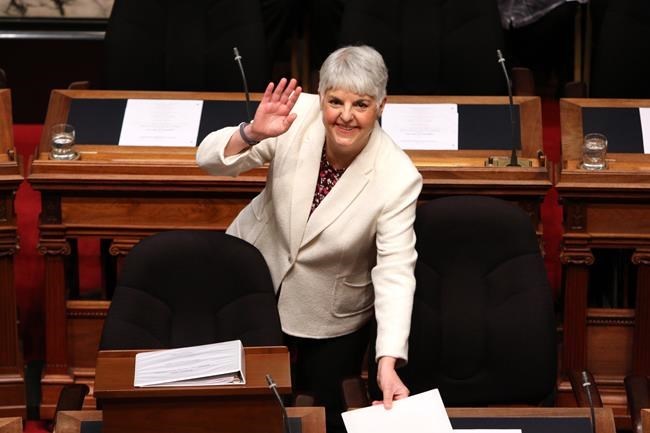The B.C. government will offer tax credits to the liquefied natural gas sector in an effort to lure more LNG investment in the province, but the new legislation will have to pass without the support of the B.C. Green Party, which called the plan “fiscally reckless.”
Finance Minister Carole James said legislation introduced Monday will lay the groundwork for thousands of new jobs and ensures that the LNG industry operates in an environmentally sustainable way.
The legislation, James said, provides the fiscal setting for LNG Canada’s proposed $40-billion liquefied natural gas plant in Kitimat. The project will include a pipeline that carries natural gas from Dawson Creek in northeastern B.C. to the new processing plant in Kitimat. From there, the gas would be liquefied for export to Asian markets.
“This is the largest private-sector investment in B.C. history,” James told reporters.
James said the project could create 10,000 construction jobs and 950 permanent jobs in the processing plant. It will generate an estimated $23 billion in government revenues over the life of the project, she said, which will fund health care, schools and child care services.
“It’s going to generate a positive return for our province, it’s going to support economic partnerships with First Nations and it’s going to operate within strong environmental protections through CleanBC,” James said.
Green Party Leader Andrew Weaver said he’s disappointed with the legislation. He said while the three Green MLAs will vote against it, they will not trigger an election by withdrawing support for the confidence and supply agreement that keeps the NDP minority government afloat.
Weaver said when the ruling B.C. Liberals first touted the benefits of a strong LNG industry in B.C., the NDP opposition said the plan was selling out an entire generation whose future relies on clean energy.
“What we’re seeing today is that generational sellout taken to a whole new level,” Weaver said. “The B.C. NDP are trying to deliver what Christy Clark couldn’t.”
Weaver said the simultaneous commitment to climate targets through CleanBC. and the propping up of the LNG industry means the government is going in two different directions.
Sierra Club B.C. said the legislation amounts to a multi-billion dollar giveaway to foreign multinationals that make it impossible to meet meaningful climate targets.
“Why is our government spending billions to subsidize fossil-fuel corporations when the resulting extreme weather will put B.C. communities at risk of increasing wildfires and drought, and rob our young people of a livable future?” asked Sierra Club B.C.’s campaigns director Caitlyn Vernon. “We have just eleven years to limit climate pollution and defend our life support systems, yet instead of doubling down on the energy efficiency retrofits and public transportation infrastructure needed to fulfill the important CleanBC program, this government is throwing fuel on the flames of the climate crisis.” The project, James said, can be completed while still meeting the province’s ambitious greenhouse gas reduction targets outlined in the CleanBC plan.
If the legislation passes, the new natural gas tax credit will reduce qualifying corporations’ income tax rate from 12 per cent to nine per cent, effective Jan. 1, 2020.
The legislation repeals the Liquefied Natural Gas Income Tax Act, which James said created barriers to investment in B.C.’s natural gas sector. The Liquefied Natural Gas Project Agreements Act would also be repealed as the government said it left taxpayers vulnerable to footing the bill for special industry tax and regulatory protections.
It’s likely the legislation will receive support from the B.C. Liberals, a party which has championed the LNG industry, both in government and now in opposition.
Former Liberal finance minister Mike de Jong said “our desire is to be supportive” of the legislation, as long as the government is up front about the costs and benefits of the agreement with LNG Canada.
“It shouldn’t surprise anyone that after the years we spent trying to promote and advance the establishment of a liquefied natural gas sector that we are philosophically in favour of the steps to try and make that happen,” de Jong told reporters.
The province announced last year that it would provide a PST exemption on construction costs for any LNG plant, which would amount to an estimated $6 billion rebate for LNG Canada.
> Les Leyne: On NDP menu: slow-roasted LNG-spiced crow, A9



